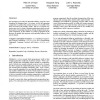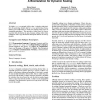123
click to vote
POPL
2004
ACM
15 years 7 months ago
2004
ACM
The ability to summarize procedures is fundamental to building scalable interprocedural analyses. For sequential programs, procedure summarization is well-understood and used rout...
201
click to vote
POPL
2004
ACM
16 years 2 months ago
2004
ACM
We present a formalization of the implementation of generics in the .NET Common Language Runtime (CLR), focusing on two novel aspects of the implementation: mixed specialization a...
229
click to vote
POPL
2004
ACM
16 years 2 months ago
2004
ACM
We aim to specify program transformations in a declarative style, and then to generate executable program transformers from such specifications. Many transformations require non-t...
222
click to vote
POPL
2004
ACM
16 years 2 months ago
2004
ACM
We present a framework for the certification of compilation and of compiled programs. Our approach uses a symbolic transfer functions-based representation of programs, so as to ch...
234
click to vote
POPL
2004
ACM
16 years 2 months ago
2004
ACM
Defunctionalization is a program transformation that aims to turn a higher-order functional program into a first-order one, that is, to eliminate the use of functions as first-cla...
231
click to vote
POPL
2004
ACM
16 years 2 months ago
2004
ACM
We investigate proof rules for information hiding, using the recent formalism of separation logic. In essence, we use the separating conjunction to partition the internal resource...
218
click to vote
POPL
2004
ACM
16 years 2 months ago
2004
ACM
We define seal, an untyped call-by-value -calculus with primitives for protecting abstract data by sealing, and develop a bisimulation proof method that is sound and complete with...
244
click to vote
POPL
2004
ACM
16 years 2 months ago
2004
ACM
stractions from Proofs Ranjit Jhala1 Kenneth L. McMillan2 1 UC San Diego 2 Cadence Berkeley Laboratories We present a technique for using infeasible program paths to automatically ...
219
click to vote
POPL
2004
ACM
16 years 2 months ago
2004
ACM
We present a polynomial time randomized algorithm for global value numbering. Our algorithm is complete when conditionals are treated as non-deterministic and all operators are tr...


